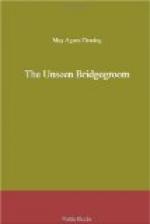“Oh, not much!” said the serene Susan. “I’m used to it, you know. I could have dodged if she had heaved the tea-pot. She takes them tantrums once or twice a day.”
Mollie spent the evening alone, of course, but in despair no longer. Hope had planted her shining foot on the threshold of her heart, and for the time she could forget she was the most miserable wife of Dr. Oleander, in the face of freedom. And Hugh Ingelow was near, and she loved Hugh. Oh, if she had never refused him—bravest, noblest heart that ever beat! the most generous gentleman the Creator ever made!
Alone Mollie sat—alone, but lonely no longer; for yonder, drifting lazily into the setting tide, the sunset glowing above and around it, floated the snow-white skift. In the amber mist fluttered the banner of blue—the banner of hope—and there, lounging easily, with his face turned to her, was the man she loved, handsome Hugh! her beloved—her darling!
“And, oh! that I were by his side,” Mollie exclaimed, in her rhapsody, “never, never to leave it again.”
Solitude and imprisonment had done this willful child some good, you see. They had taught her to think—to know herself. She never could be the same crude, madcap Mollie again.
The last, low, yellow gleam died out of the sunset—slowly crept up the twilight, palely, gemmed with stars. A round, red moon showed its crimson disk above the silvery horizon line, whitening as it arose, until it trailed a flood of crystal radiance over the purple bosom of the sleeping sea. And still Mollie sat there, watching the shining stars creep out, and still the fairy bark floated lazily with the drifting current. She could have sat there and watched him forever—her noble, gallant Hugh! But by and by, as the night wind grew chill, the little white boat, glided away and disappeared.
The entrance of Mrs. Sharpe, with her night-lamp, aroused Mollie from her trance. She turned eagerly round to greet her. Next to Hugh Ingelow, her hope now was in this mysterious woman.
Mrs. Sharpe closed the door carefully after her, set the lamp on the table, dropped the curtain, and then turned her face to Mollie. One look at that face told Mollie something had occurred.
“What is it?” she asked in a breathless whisper.
And Susan Sharpe, bending down, whispered hurriedly:
“Doctor Oleander is here.”
Mollie barely repressed a cry. Susan Sharpe caught her, in alarm, by the shoulder.
“Hush! Are you crazy? Not a word. Yes, he’s down-stairs—came half an hour ago. Don’t look so frightened—he won’t trouble you this time.”
“This time,” repeated Mollie, noticing the emphasis. “What do you mean?”
“That he was only run down to see how we get along, and to tell us to be all ready for an early start. We are going to Cuba.”
“We?”
“Yes,” with a grim smile and nod, “we. You, and me, and Doctor Oleander.”




